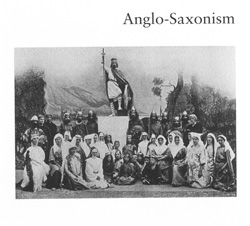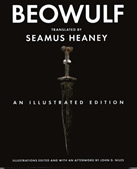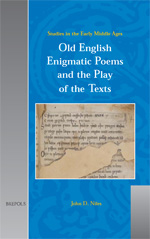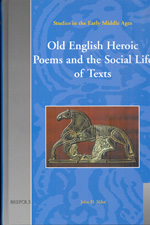




![]()
![]()
![]()
![]()
![]()
![]()
Publications
Cited chronologically in each of six categories.
Note that full-text pdf files of many of my published articles are available for reading or downloading free of charge at wisc.academia.edu/JohnNiles.
Minor Publications and Reviews
Monographs
1. Beowulf: The Poem and Its Tradition. Cambridge, MA: Harvard University Press, 1983.
A comprehensive study of the poem. Reviewed at length in Robert J. Hasenfratz's Beowulf Scholarship: An Annotated Bibliography, 1979-1990 (New York: Garland, 1993), pp. 160-65.
2. Homo Narrans: The Poetics and Anthropology of Oral Literature. Philadelphia: University of Pennsylvania Press, 1999.
Now available in paperback (2010).
Draws on Old English literary scholarship and personal fieldwork in Scotland in an attempt to account for the world-making powers of narrative.
3. Old English Enigmatic Poems and the Play of the Texts. Studies in the Early Middle Ages, 13. Turnhout, Belgium: Brepols. 2006.
A collection of original essays on Old English literature with emphasis on riddles, poems incorporating runes, and other enigmatic texts.
4. Old English Heroic Poems and the Social Life of Texts. Studies in the Early Middle Ages, 20. Turnhout, Belgium: Brepols, 2007.
A companion to the previous item. A collection of original essays on Old English literature with emphasis on its heroic dimension.
5. Beowulf and Lejre. Medieval and Renaissance Texts and Studies 323. Tempe: Arizona Center for Medieval and Renaissance Studies, 2007.
Develops the implications (particularly for Beowulf studies) of dramatic archaeological finds made at Lejre, Denmark, during 1986–2005. A collaborative volume featuring contributions by Tom Christensen and Marijane Osborn.
6. The Idea of Anglo-Saxon England 1066-1901: Remembering, Forgetting, Deciphering, and Renewing the Past. Oxford: Wiley-Blackwell, 2015.
Reviews the modern recovery of a knowledge of the language and literature of the Anglo-Saxons, while also tracing the changing contours of the idea of Anglo-Saxon England itself over time. Available in hardcover and e-book.
7. Old English Literature: A Guide to Criticism with Selected Readings. Oxford: Wiley-Blackwell, 2016.
Surveys trends, milestones, and problems in the modern critical reception of the literature of the Anglo-Saxons. Available in hardcover, paperback, and e-book.
8. God's Exiles and English Verse: On the Exeter Anthology of Old English Poetry. Exeter: University of Exeter Press, 2019.
A comprehensive study of the earliest major anthology of English verse.
9. Webspinner: Songs, Stories, and Reflections of Duncan Williamson, Scottish Traveller. Jackson: University Press of Mississippi, 1922.
A study of the role of a single gifted tradition-bearer in the oral culture of the Scottish travelling people, or tinkers.
Chief Editions

1. Old English Literature in Context: Ten Essays. Edited with an introduction. Cambridge: D.S. Brewer, 1980.
Explores a set of interlocking contexts (manuscript studies, patristic exegesis, oral theory, and comparative literary studies) that have a bearing the understanding of Anglo-Saxon literary texts.
2. A Beowulf Handbook. Co-edited with Robert E. Bjork. Lincoln: University of Nebraska Press, 1997.
A set of 18 chapters by various scholars. A comprehensive guide to the poem.

3. Anglo-Saxonism and the Construction of Social Identity. Co-edited with Allen J. Frantzen. Gainesville: University Press of Florida, 1997.
A set of 9 original essays by various scholars. On the modern development of Anglo-Saxon studies.

4. Beowulf: An Illustrated Edition. New York: Norton, 2007.
A reissue of S. Heaney’s translation of the poem accompanied by a set of images designed to illustrate the Iron Age material world referred to in the poem. Includes my substantial Afterword, “Visualizing Beowulf.”
5. Klaeber’s Beowulf. 4th edition. Co-edited with R.F. Fulk and Robert E. Bjork. Toronto: University of Toronto Press, 2008.
A complete revision of the poem's chief scholarly edition, last re-edited in 1950.

6. The Genesis of Books: Studies in the Scribal Culture of Medieval England in Honour of A.N. Doane. Co-edited with Matthew T. Hussey. Turnhout: Brepols, 2011.
A set of twelve original essays by various scholars, edited with an introduction.

7. Anglo-Saxon England and the Visual Imagination.Co-edited with Stacy Klein and Jonathan Wilcox. Tempe: Arizona Center for Medieval and Renaissance Studies, 2016.
A set of ten original essays by specialists, edited with a substantial introductory chapter, "Negotiating the Anglo-Saxons' Visual World."

8. Medical Writings from Early Medieval England, Volume I: The Old English Herbal, Lacnunga, and Other Texts, co-edited with Maria A. D'Aronco. Cambridge, MA: Harvard University Press, 2023. .
The first comprehensive edition and translation of Old English writings on health and healing in more than 150 years. For the Dumbarton Oaks Medieval Library.
Minor Books and Editions
1. Seven Songs of Guilhem IX: First of the Known Troubadours. Tucson: Grilled Flowers Press, 1978. Translations and an introduction.
2. "Guilhem IX: The Songs." Part III (pp. 123-89) of the collective volume The Music of the Troubadours. Santa Barbara: Ross-Erikson, 1979. Introduction, texts, translations, textual notes, and commentary.

3. The European Folktale: Form and Nature. Philadelphia: Institute for the Study of Human Issues, 1982. Translation of Das europäische Volksmärchen: Form und Wesen, by Max Lüthi, with an introduction and new notes. Reissued in paperback by Indiana University Press, 1986.
4. Anglo-Scandinavian England: Norse-English Relations in the Period Before the Conquest. Co-edited with Mark Amodio. Lanham, MD: University Press of America, 1989.
A set of seven original essays by various scholars, edited with an introduction. First published as Scandinavian Studies 59/3 (1987).
5. "History into Literature: Ideology, Values, and the Shaping of History in Narratives Relating to Tenth- and Eleventh-Century England." A set of eight original essays by various scholars, edited with an introduction. Mediaevalia 17 (1994, for 1991): 1-176.

6. Chapman’s Pack. Madison: Parallel Press, 2003. A chapbook of poems, chiefly on the theme of storytelling.
7. From Word to Print - and Beyond. Special issue of Western Folklore. Vol. 72, no. 3, 2013. Features contributions by three noted folklorists, plus a substantial introduction.
8. Living Epics of China and Inner Asia. Special issue of Journal of American Folklore, summer 2016 (vol. 129, no. 513). Features articles by experts from three continents (Asia, Europe, North America).
Articles and Chapters
"Ring-Composition in La Chanson de Roland and La Chançun de Willame." Olifant 1:2 (1973): 4-12. Discussion in Olifant 1:3 (1974): 3-22 passim.
"The Ideal Depiction of Charlemagne in La Chanson de Roland." Viator 7 (1976): 123-39.
"Tam Lin: Form and Meaning in a Traditional Ballad." Modern Language Quarterly 38 (1977): 336-47.
"Lamkin: The Motivation of Horror." Journal of American Folklore 90 (1977): 49-67.
"Hans Christian Andersen's Grantræet and the Old English Dream of the Rood." Anderseniana (Denmark) 3rd series 2 (1977): 351-60.
"Patterning in the Wanderings of Odysseus." Ramus 7 (1978): 46-60.
"Narrative Anomalies in La Chançun de Willame." Viator 9 (1978): 251-64. Discussion in Olifant 5 (1978): 231-49 passim.
"The Old Alliterative Verse Form as a Medium for Poetry." Mosaic 11:4 (1978): 19-33.
"A Traditional Ballad and Its Mask: Tam Lin." In Ballads and Ballad Research, ed. Patricia Conroy. Seattle: University of Washington, 1978. 147-58.
"On the Design of the Hymn to Delian Apollo." Classical Journal 75 (1979): 36-39.
"Ring Composition and the Structure of Beowulf." PMLA 94 (1979): 924-35. Discussion in PMLA 95 (1980): 246-47 and 870-73.
"The Æcerbot Ritual in Context." In Old English Literature in Context, ed. J. Niles. Cambridge: D. S. Brewer and Totowa, N.J.: Rowman and Littlefield, 1980. 44-56.
"On the Logic of Le Pèlerinage de Charlemagne." Neuphilologische Mitteilungen 81 (1980): 208-16.
"Formula and Formulaic System in Beowulf." In Oral Traditional Literature: A Festschrift for Albert Bates Lord, ed. John Miles Foley. Columbus, Ohio: Slavica Press, 1980. 394-415.
"Storytelling by the Very Young." In Folklore Studies in the Twentieth Century, ed. Venetia J. Newall. Ipswich: Boydell & Brewer, 1980. 320-31.
"Beowulf 431-32 and the Hero's Civility in Denmark." Notes and Queries N.S. 27 (1980): 99-100.
"De Normandiers en het Chanson de Geste." Spiegel Historiæl 15 (1980): 279-85.
"The Normans and the Chansons de Geste." In VIII Congreso de la Société Rencesvals. Pamplona, 1981. 359-66.
"Compound Diction and the Style of Beowulf." English Studies 62 (1981): 489-503.
"Some Uses of Tradition in the Stories of Young Children." International Folklore Review 2 (1982): 17-22.
"Teaching Beowulf as Performance." In Approaches to Teaching Beowulf, ed. Jess B. Bessinger and R.F. Yeager. New York: MLA, 1984. 157-60.
"Context and Loss in Scottish Ballad Tradition." Western Folklore 45 (1986): 83-106.
"Symbolic Language in the Ballads." In Semiotica 1986, ed. John Deely and Jonathan Evans. Lanham, Md.: University Press of America, 1987. 33-42.
"Skaldic Technique in Brunanburh." Scandinavian Studies 59 (1987): 356-66.
"The U.C. Berkeley Legend Archives." In The Questing Beast: Perspectives on Contemporary Legend, Vol. 4. Sheffield: Sheffield Academic Press, 1989. 103-11.
"Pagan Survivals and Popular Beliefs." Chapter 7 of The Cambridge Companion to Old English Literature, ed. Maldolm Godden and Michael Lapidge. Cambridge: Cambridge Univ. Press, 1991. 126-41. 2nd edition, 2013, pp. 120-36.
"Toward an Anglo-Saxon Oral Poetics." In De Gustibus: Essays for Alain Renoir, ed. John Miles Foley. Albert Bates Lord Studies in Oral Tradition, no. 11. New York: Garland Press, 1992. 359-77.
"Sign and Psyche in Old English Poetry." American Journal of Semiotics 9 (1992): 11-25.
"Locating Beowulf in Literary History." Exemplaria 5 (1993): 79-109.
"Understanding Beowulf: Oral Poetry Acts." Journal of American Folklore 106 (1993): 131-55.
"Rewriting Beowulf: The Task of Translation." College English 55 (1993): 858-78.
"Maldon and Mythopoesis." Mediaevalia 17 (1994 for 1991): 89-121.
"Editing Beowulf: What Can Study of the Ballads Tell Us?" Oral Tradition 9 (1994): 440-67.
"Folklore on Film." Folklore in Use: Applications in the Real World 2:1 (1994): 25-36.
"The Role of the Strong Tradition-Bearer in the Making of an Oral Culture." In Ballads and Boundaries: Narrative Singing in an Intercultural Context, ed. James Porter, UCLA. Los Angeles: Department of Ethnomusicology and Systematic Musicology, UCLA, 1995. 231-40.
"Beowulf, Truth, and Meaning." Chapter 1 of A Beowulf Handbook, ed. Robert E. Bjork and John D. Niles. Lincoln: Univ of Nebraska Press, 1997. 1-12.
"Myth and History." Chapter 10 of the same title. 213-32.
"Appropriations: A Concept of Culture." Chapter 9 of Anglo-Saxonism and the Construction of National Identity, ed. Allen J. Frantzen and John D. Niles. Gainesville: Univ. Press of Florida, 1997. 202-28.
"The Wasteland of Loegria: Geoffrey of Monmouth's Reinvention of the Anglo-Saxon Past." Reinventing the Middle Ages and Renaissance: Constructions of the Medieval and Early Modern Periods, ed. William Gentrup. Turnhout, Belgium: Brepols, 1998. 1-18.
"British-American Balladry." In Teaching Oral Traditions, ed. John Miles Foley. MLA Options for Teaching series. New York: Modern Language Association of America, 1998. 280-90.
"Reconceiving Beowulf: Poetry as Social Praxis." College English 61 (1998): 143-66.
"Cades Cove: A Study in Regional Folksong Culture." Ljudske balade med izrocilom in sodobnostjo / Ballads between Tradition and Modern Times, ed. Marjetka Golez. Ljubljana: Zalozba ZRC SAZU, 1998. 224-33.;
"Exeter Book Riddle 74 and the Play of the Text." Anglo-Saxon England 27 (1998): 169-207.
"Widsith and the Anthropology of the Past." Philological Quarterly 78 (1999): 171-213.
"Byrhtnoth's Laughter and the Poetics of Gesture." In Anglo-Saxon Humour, ed. Jonathan Wilcox. Woodbridge: Boydell Press, 2000. 11-32.
"Draumkvæde: Unique Masterpiece of Folk Poetry?" In Ballad and Ballad Studies at the Turn of the Century. Proceedings of the 30th International Conference of the Ballad Commission of S.I.E.F., 15-20 August 2000. Ed. Nicolai Constantinescu. Bucharest, Romania, 2001. 156-66.
"The Problem of the Ending of The Wife's Lament." Speculum 78 (2003): 1107-50.
"The Trick of the Runes in The Husband's Message." Anglo-Saxon England 32 (2003): 189-223.
“The Myth of the Anglo-Saxon Oral Poet" Western Folklore 62: 1&2 (2003), 7-61.
“Bede’s Cædmon, ‘The Man Who Had No Story’ (Irish Tale-Type 2412B).” Folklore (London) 117 (2006): 141–55.
“Beowulf’s Great Hall.” History Today 56:10 (October 2006): 40-44.
"True Stories and Other Lies." In Myth in Early Northwest Europe, ed. Stephen O. Glosecki. Tempe: Arizona Center for Medieval and Renaissance Studies, 2007. 1–30.
“Trial by Ordeal in Anglo-Saxon England: What’s the Problem with Barley?” In Studies in Early Medieval Britain. Gen. ed. Nicholas Brooks. Ashgate Publishing Limited, UK, 2009. 369-82.
“Visual Narrative: Arthur Rackham and the Ballads.” In The Nordic Storyteller. Ed. Thomas DuBois and Susan Brantley. Cambridge: Cambridge Scholars Publishing, 2009. 121-44.
“On the Danish Origins of the Beowulf Story.” In Anglo-Saxon England and the Continent. Ed. Joanna Story and Hans Sauer. Tempe, AZ: Arizona Center for Medieval and Renaissance Studies, 2011. 41–62.
“Beowulf 2545b–49: The Stream that Bursts into Flame at the Dragon’s Barrow.” In Translating the Past: Essays on Medieval Literature. Ed. Jane Beal and M.B. Busbee. Tempe: Arizona Center for Medieval and Renaissance Studies, 2012. 25-36.
"Orality." In The Cambridge Companion to Textual Scholarship. Ed. Julia Flanders and Neil Freistat. Cambridge: Cambridge University Press, 2013. 205-23.
“The Fonthill Ghost Word, the Fonthill Thief, and Early West Saxon Textual Culture.”In The Genesis of Books: Studies in the Scribal Culture of Medieval England. Ed. M. Hussey and J. Niles. Turnhout: Brepols, 2011.
“Pre-Christian Anglo-Saxon Religion.“ In The Handbook of Religions in Ancient Europe. Ed. L.B. Christensen, Olav Hammer, and David A. Warburton. London: Equinox, 2013. 305-23.
“The Myth of the Feud in Anglo-Saxon England.“ Journal of English and Germanic Philology114 (2015): 163-200.
“Hawks, Horses, and Huns: The Impact of Peoples of the Steppe on the Folk Cultures of Northern Europe.“ Western Folklore 75 (2016): 5-36.
"Who Wrote the Non-Racist Essay "The Anglo-Saxon Race"? Longfellow and Nineteenth-Century American Anglo-Saxonism." In Old English Tradition: Essays in Honor of J.R. Hall, ed. Lindy Brady. Tempe, AZ: Arizona Center for Medieval and Renaissance Studies, 2021. 293-301.
"Reassessing Anglo-Saxon Origins from a Eurasian Perspective." In Global Perspectives on Early Medieval England, ed. Karen Louise Jolly and Britton Elliott Brooks. Woodbridge: Boydell, 2022. 139-70.
"Myths of the Eastern Origins of the Franks: Fictions or a Kind of Truth?" Chapter 16 of Origin Legends in Early Medieval Western Europe, ed. Lindy Brady and Patrick Wadden. Leiden: Brill, 2022. 385-404.
Minor Publications and Reviews
Original poems and translations in various journals and anthologies, 1969-2007.
"Homeric Hymn V: To Aphrodite." Translation of the central part. Arion 8 (1969): 343-46. Partially rpt. in The Oxford Book of Classical Verse in English Translation. Oxford: Oxford University Press, 1995.
"Three Songs from Guilhem IX." Translations. Arion N.S. 3/4 (1976): 483-89.
"Translating the Troubadours." Review of Paul Blackburn's Proensa. University Publishing 9 (1980): 6.
"British Folkways Films." Review of three documentary films by Timothy Neat. Journal of American Folklore 95 (1982): 116-19.
"Cædmon." Article in volume 2 of the Dictionary of the Middle Ages, ed. Joseph Strayer. New York: Scribner's, 1983.
Review of Kevin S. Kiernan, Beowulf and the Beowulf Manuscript, in Speculum 58 (1983): 765-67.
Review of Ward Parks, Verbal Dueling in Heroic Narrative: The Homeric and Old English Traditions, in Speculum 67 (1992): 465-67.
Review of Katherine O'Brien O'Keeffe, Visible Song: Transitional Literacy in Old English Verse, in Speculum 68 (1993): 851-53.
Review of Seth Lerer, Literacy and Power in Anglo-Saxon England, in Speculum 68 (1993): 833-35.
Review of George Jack, Beowulf: A Student Edition, in Speculum 72 (1997): 176-77.
Review of Linda Dégh, Narratives in Society: A Performer-Centered Study of Narration, FF Communications No. 255, in Journal of American Folklore 110 (1997): 214-16.
Review of Craig R. Davis, Beowulf and the Demise of Germanic Legend in England, in Speculum 73 (1998): 497-99.
Review of Albert Bates Lord, The Singer Resumes the Tale, in Speculum 73 (1998): 560-62.
Article on "Chapbooks," Encyclopedia of Folklore and Literature, ed. Mary Ellen Brown and Bruce A. Rosenberg. Santa Barbara: ABC-CLIO, 1998. 109-112.
Review of James Porter and Herschel Gower, Jeannie Robertson: Emergent Singer, Transformative Voice, in Journal of American Folklore 112 (1999): 213-15.
"Beowulf." In Medieval Folklore: An Encyclopedia of Myths, Legends, Tales, Beliefs, and Customs, ed. John Lindow and Carl Lindahl. Santa Barbara: ABC-CLIO, 2000, I:87-92.
Review of John Hill, The Anglo-Saxon Warrior Ethic: Reconstructing Lordship in Early English Literature, in JEGP 101 (2002): 434–37.
Electronic review of John G. Gibson, Traditional Gaelic Bagpiping, 1745-1945 (McGill-Queen’s University Press, 1998), in Journal of Folklore Research, 2003.
“Prizes from the Borderlands.” Oral Tradition 18 (2003): 223-24 (as part of a special issue on “The State of the Art in Oral Literary Studies,” ed. John Miles Foley).
Review of Phillip E. Bennett and Richard Firth Green (eds), The Singer and the Scribe: European Ballad Traditions and European Ballad Cultures, in Notes and Queries 53 (2006): 96–97.
Review of Alaric Hall, Elves in Anglo-Saxon England: Matters of Belief, Health, Gender and Identity, in Speculum 83 (2008): 1000–02.
Review of Chris Jones, Strange Likeness: The Use of Old English in Twentieth-Century Poetry, in Contemporary Literature, 49 (2008): 293–99.
Review of Oral Art Forms and Their Passage into Writing, ed. by Else Mundal and Jonas Wellendorf, in JEGP 108 (2009): 378–80.
Double review of Steve Newman, Ballad Collection, Lyric, and the Canon and of The Glenbuchat Ballads, ed. by David Buchan and James Moreira, in Journal of American Folklore 123 (2010): 228–31.
Review of On the Aesthetics of Beowulf and Other Old English Poems, ed. by John M. Hill, in JEGP 111 (2012): 516-19.
Review of The Dating of Beowulf: A Reassessment, ed. by Leonard Neidorf, in Speculum 91 (2016): 541-43.
Review of 'Charms', Liturgies and Secret Rites in Early Medieval England, by Ciaran Arthur, in Speculum 95:1 (2020): 192-94.
Review of The Oral Epic: From Performance to Interpretation, by Karl Reichl, in Western Folklore 82:1 (2023): 114-16.
Review of The Broadside Ballad in Early Modern England: Moving Medium, Tactical Publics, by Patricia Fumerton, in Journal of American Folklore 136 (2023): 121-22.
Forthcoming and in Progress
Items will be posted here from time to time.

jdniles@wisc.edu
Updated April 2019











